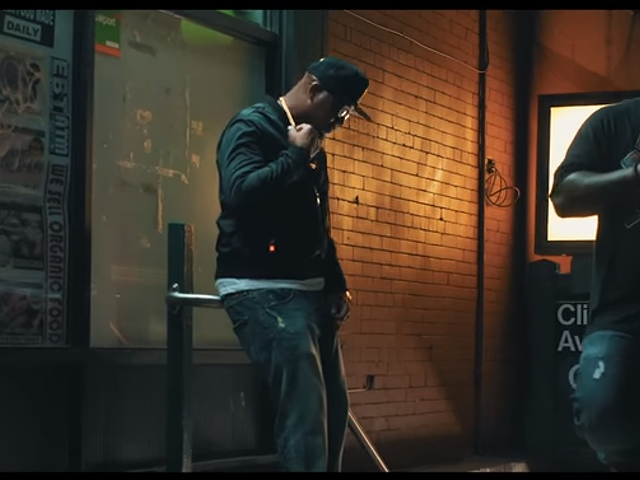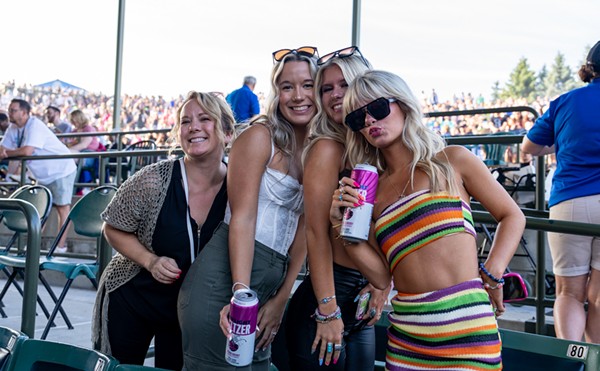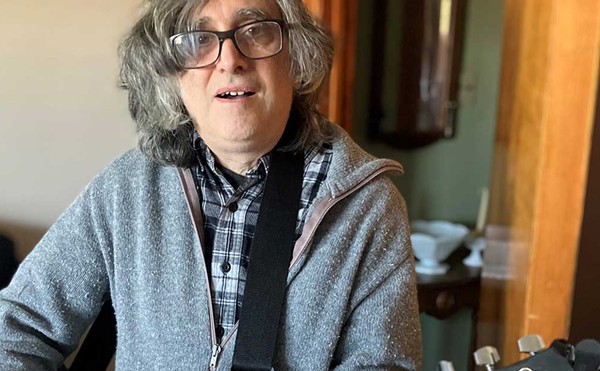The year is 1980 and Renee Scroggins is watching Close Encounters of the Third Kind. “I was amazed at the part where they communicate with the alien ship with music,” Renee says. “I started looking out my window in the projects and wondered what it would be like if the ship landed in our playground area.” Thus was born “UFO,” a song you have almost assuredly heard at some point in your life, whether you knew it or not.
Scroggins is original vocalist and de facto leader of ESG, a group of sisters that formed one of the most influential post-punk/funk/no wave bands to emerge out of New York in the early '80s. ESG stood for Emerald, Sapphire, and Gold — two of their birthstones, plus the status they hoped to reach with their records.
The sisters — Renee, Valerie, Deborah, and Marie Scroggins — originally started playing music to stay off the South Bronx streets and out of trouble. Their mother saw great potential in what music could do for them, so she got the money to buy her daughters some instruments. Then she held them to a weekly performance schedule in order to keep their practice consistent; sure enough, her encouragement and persistence paid off, and they were eventually discovered at a talent show by Ed Bahlman, founder of the short-lived and influential downtown New York City label 99 Records (Liquid Liquid, Glenn Branca).
To form in New York in the early '80s is to be at the epicenter of so much, and yet ESG were able to forge something completely their own. As much as that was the case, they also happened to fit right into the arty no-wave dance punk scene that was having its heyday at the time; the ESG sound, bare bones yet pulsing with rhythm, the most genuine mixture of punk and funk imaginable, became vital not only in New York but the U.K. as well, thanks to the fact that three of their earliest studio songs were produced by post-punk producer Martin Hannett, while the 7-inch "You're No Good" was released by associated British label Factory Records (Joy Division, New Order, Magazine).
The group's unique music was deeply influenced by the neighborhood they grew up in. Latin sounds would trickle in through their windows on warm summer nights; instruments like maracas, bongos, and congas were naturally absorbed into their songs. On top of that, the deeply funky grooves of James Brown made a lasting impression, particularly — and somewhat obviously — with regard to both the importance and prominence of the drums and bass.
But ESG was also heavily influenced by a part of music history in Detroit: Motown. The girls were enthralled by the Jackson 5 on TV and loved virtually everything they heard from the prolific label.
Detroit, in turn, equally loves the band. One of the more famous instances of the "UFO" sample includes the late local hip-hop legend J Dilla's track "Geek Down"; garage heroes the Dirtbombs covered "My Love For You," which also happens to be the favorite ESG track of Casual Sweetheart drummer Dina Bankole (also of Skinny Wrists, Secret Twins, and Seraphine Collective), who told us, "I first heard the Dirtbombs' version and was pleasantly surprised to find out it was an ESG song. It's just such a dancey, Motown-y, groovy, funkified jam."
The band's influence on Detroit casts a wider net than through samples and covers too, well-articulated by Dave Buick (Third Man Records, the Go, Feelings, Italy Records) when he says, "Every time I don't play anything on my bass when most people would add a ton of goofy unnecessary notes and crap, I am covering ESG."
ESG, of course, is important not just because of what they sound like, but who they are. "Legendary, pioneering, and most importantly women-led, ESG at its core is a band of all black women," Bankole says.
"As a black woman myself, they are a band I particularly revere and look up to. Visibility is so important. A lot of people don't realize just how important it is to see people who look just like you do their thing in the spotlight, especially when you're female and brown. In the 'America' we currently find ourselves in, it's become even harder to just be if you're female and even more so if you're brown, let alone female and brown. I'm so glad that ESG is still doing its thing."
As much as their music was embraced by certain sectors, however, the larger world never really quite gave ESG their due. Sure, their sound made perfect sense in the arty avenues of post-punk, but thanks to the four otherworldly guitar notes of "UFO" that have now been sampled over 450 times, they were unwittingly thrown into the hip-hop sphere as well, with everyone from the Notorious B.I.G. and Public Enemy to Mobb Deep and MF Doom having sampled "UFO." The song is so singular, so strange, that samples have truly popped up everywhere — from Miles Davis to Nine Inch Nails to Liars and Prefuse 73.
Amid all this sampling, the original creators were left in the dust. In 1992, ESG made their feelings loud and clear with an EP titled Sample Credits Don't Pay Our Bills; here they were, toiling away at their day jobs while artists sampled their work left and right without permission or payment. It left quite a bitter taste, but some of the sourness has since dissipated as a company was eventually hired to help them track down royalties owed throughout the years. The process has been successful, but not without its challenges.
Throughout all this, the band never stopped making and performing music in various incarnations. Apart from the quintessential early singles, various just-as-necessary works have come out, including two albums and two compilations in the 2000s on London-based label Soul Jazz Records and their most recent album, 2013's self-released Closure. In addition to that, a documentary about the history of ESG (which will also give a glimpse into recording and touring) is in the works, which Renee hopes to get off the ground this year.
ESG continues to tour the world over, bringing their Latin-influenced polyrhythms and minimalistic funk to new and old audiences alike, landing in Detroit at the inaugural Barely Human Festival at El Club on Feb. 10.
The band began as a family affair and continues so to this day; the incarnation at Barely Human will include original vocalist Renee, joined by her daughter Nicole (who has been playing bass and doing background vocals for 18-plus years), son Nicholas (who has been doing percussion/back vocals for seven years), and a cousin on drums.
In advance of the performance, Metro Times spoke with Renee about the legacy of the band, her experience in the music industry, and more.
Metro Times: What was it like as a black woman making music in the '80s in the South Bronx?
Renee Scroggins: In most cases it was actually an advantage, but every now and then I would run into a club promoter or stage manager that was really sexist or racist. Coming from the South Bronx, and how my mother brought us up, I did not allow them to disrespect us!
MT: You have spoken a few times in the past couple years about not performing, but you're back out again. I hope this is because you're feeling well? How does your body handle the work these days?
Scroggins: This year is our 39th year performing (maybe next year at 40 should be it) but people want to hear the music and it truly gives me great pleasure to perform. I had to have surgery on one knee, and even after surgery, it still gives me a little trouble now and then. I am feeling OK, and hope to stay in good health.
MT: What is like to have been a family band your entire life? What does family mean to you? What was it like to be pregnant while in the band?
Scroggins: It is very hard to work with your family because you will have disagreements and that can be hard to deal with if you are touring. Family to me means love, and someone that always has your back. It was not a big issue being pregnant in the band once I got over the morning sickness.
MT: What's your own favorite ESG song?
Scroggins: I actually have two: "Everything Goes" from the Keep on Moving album and "You Did Me Wrong" from the Closure album.
MT: As the creator of one of the most heavily sampled songs in music history, can you tell me a little bit about what it is like to see people hear this song, which they recognize from somewhere else, being performed by the original musicians?
Scroggins: It was an interesting experience. I had no problem until somebody would say to me, "You're playing this artist's song," and I would tell them, "No, he is playing my song!"
MT: How do you feel about the way ESG was embraced by the worlds of punk and art?
Scroggins: I loved it. It certainly took us into a different world.
MT: I read that you don't like the term no wave. Why not? What do you think of post-punk and all the other terms that get applied to your music?
Scroggins: I just don't like labels. I consider our music dance music, if we have to use terms or labels.
MT: What do you yourself think was so distinctive about the ESG sound?
Scroggins: It was just simple vocals, bass, drums, and percussion with a pinch of guitar here and there. I think that's what keeps it so timeless.
MT: How successful have you been at hunting down money owed to you via sampling?
Scroggins: It's much better now. When it first occurred we did not have laws that protected this issue. I don't like reflecting on the sampling as sometimes it's still a problem.
MT: Have you ever personally spoken with anyone who has sampled you? Do you have any positive memories about connecting with any artists that have sampled your work?
Scroggins: Yes I did, and he thought it was amusing. That turned out to be a real "colorful" conversation. I have not had any positive experiences with anyone that has sampled my work.
MT: Can you discuss your favorite tour story that stands out in your mind?
Scroggins: We were in a small city in Spain and we were hungry after our performance. Our tour guide family had a restaurant there, and they opened it for us and fed us, but everyone in the band had to sing show tunes, and the tour guide and her family did too! I have never in my life had so much fun. That will stay in my memories forever.
MT: What is your relationship with the city of Detroit?
Scroggins: We have played Detroit twice before, but it has been quite awhile. Of course I have Detroit influences — the Motown sound! I grew up listening to the Supremes, Martha and the Vandellas ... I would have to name about every performer on the label.
MT: What can we expect to see at your performance at El Club?
Scroggins: You can expect to have a good time and dance!
ESG hits El Club for Barely Human Festival with Casual Sweetheart, Paint Thinner, and more on Friday, February 10th; music at 8 p.m.; 4114 Vernor Hwy., Detroit; elclubdetroit.com; $20 advance, $25 door, $50 three-day-passes.





